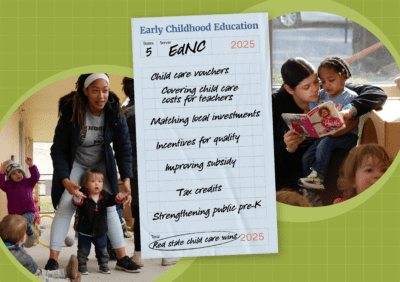
In January 2023, there were around 12 active early childhood educator apprentices across the state — teachers working in early childhood classrooms while going to school. Now, there are 368.
One of those, Micky Johnson, is a “floater,” a flexible staff member who moves between classrooms to support teachers and students at Kids R Kids Learning Academy RTP, a licensed child care center in Durham. Johnson said she has wanted to return to school for a long time but never had the opportunity.
Through the early childhood educator apprenticeship program, Johnson is earning her associate degree at Durham Technical Community College while applying what she learns to her teaching practice. She is also accessing mentorship, tuition assistance through the state-funded TEACH scholarship, and wage increases from her employer.
![]() Sign up for Early Bird, our newsletter on all things early childhood.
Sign up for Early Bird, our newsletter on all things early childhood.
Johnson said she plans to continue her education through her master’s degree.
“It means everything in the world to me,” Johnson said. “I feel like if they’re investing in me, I’m going to invest in being a good employee in return.”
The state’s lack of child care, experts say, is mostly due to an inability to attract and retain high-quality staff in a low-wage field. Apprenticeships, when paired with other tuition and wage supports, offer a promising strategy to draw people into the field and give them reasons to stay.
“(Child care programs) need something to incentivize people to join the field, and the idea that there’s a set program with a pathway appeals to people. They’re not just going for a job, they’re going for a career,” said Morgan Ford, program director of Building Bright Futures, an initiative to support early childhood apprenticeships from the Division of Child Development and Early Education (DCDEE) and the North Carolina Business Committee for Education (NCBCE), a nonprofit that operates out of the Office of the Governor.
Related reads

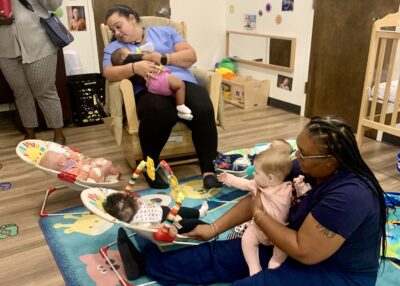

The rapid expansion of early childhood educator apprenticeships in recent years was thanks to an infusion of state and federal funding, a push for awareness and technical assistance, and a field eager to recruit and retain high-quality teachers.
Now that one-time funding has run out, and state and federal early childhood investments are uncertain at best, state leaders are figuring out how to continue to expand apprenticeships and pre-apprenticeships within a fragile industry.
The future of the early childhood profession — often referred to as “the workforce behind the workforce” — is at stake, experts told EdNC. So are the state’s broader economic goals.
“We have so many businesses coming to the state now,” Ford said. “We need to provide child care.”
Related reads

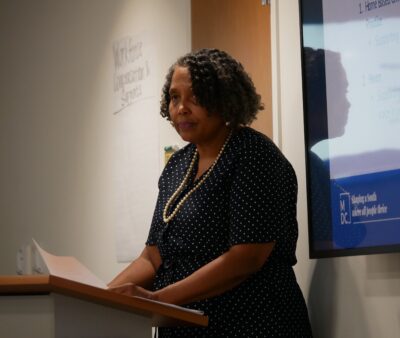

Expanding apprenticeship in a ‘female-dominated, non-industry’ career
Financial incentives and wrap-around support for both child care programs and apprentices drove the recent growth of early childhood educator apprenticeship programs across the state. With most of that funding dried up, providers and teachers will not have the same level of support without a new funding source.
Apprenticeships, which must be registered through the state-level ApprenticeshipNC, provide individuals with the ability to work while furthering their education and earning nationally recognized credentials. Their high school companions, pre-apprenticeships, provide a similar structure for students to gain hands-on work experience while going to school — plus a tuition waiver for students who continue on to an apprenticeship and enroll at a community college.
The participating employer is required to provide wage increases, mentorship, and a competency checklist for apprentices to complete.
The registered early childhood educator apprenticeship program has been available in the state since 2020. But between labor shortages, pandemic stresses, and funding concerns, providers often did not have the capacity to set up and maintain the administratively taxing programs. They also might have not associated the model with their field.
“When you hear the whole rest of the world talk about apprenticeships, you very rarely hear them talk about female-dominated, non-industry careers,” said Valerie Williams, a family and consumer sciences education consultant at the Department of Public Instruction (DPI).
Two temporary funding streams got the model on more providers’ radars and provided financial incentives to businesses often running on razor-thin margins.
In 2021, the legislature allocated $12 million to diversify and expand apprenticeships to underserved parts of the state and smaller businesses. The state provided 50% wage reimbursements to employers, plus funding for onboarding and training. Community colleges in Tier 1 and 2 counties could receive up to $2,500 per apprentice for tuition, books, fees, and supplies. All of that funding had to be obligated by the end of 2024.
Related reads

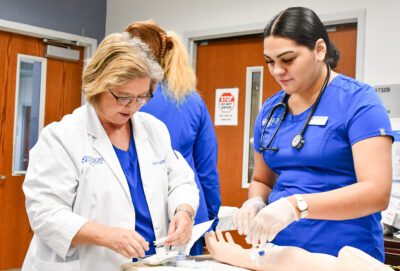

And in 2023, former Gov. Roy Cooper launched Building Bright Futures (BBF), a pilot specifically aimed at expanding the apprenticeship model in the early childhood education field, with a little more than $3 million from the federal American Rescue Plan Act and another $1 million from DCDEE.
Ford and her team hit the ground running. They spread awareness, broke down barriers, and tailored funding to the needs of the field. They provided a 50% wage reimbursement per apprentice to employers. That meant that employers accessing both funding streams were receiving full wage reimbursement for apprentices.
“A lot of what we did during the pilot was to incentivize people to try apprenticeship because it was a new and daunting thing to a lot of people,” Ford said.
The pilot also covered transportation costs, professional development opportunities, classroom supplies to ensure high-quality experiences for apprentices, and onboarding costs like background checks, uniforms, and medical evaluations.
It also provided stipends and a community of practice for mentors, a key component to a successful apprenticeship.
“A lot of our apprentices talk about how this is really, really hard,” Ford said. “I have a family, I’m working full-time, I’m going to school, and the mentor is the person that keeps me going. They remind me of my why. They remind me of the passion I have for the field and and they keep me focused on the future.”
The BBF pilot funding went from January 2023 to December 2024 and supported almost 500 pre-apprentices and apprentices. Since January 2025, BBF has been operating at a reduced level of funding from the federal Preschool Development Grant Birth through Five (PDG B-5). BBF received $647,450 through the end of September 2025. The grant is three years long, which the state applies to renew each year.
BBF is still supporting apprentices, although at a lower level than they were during the pilot. This includes wage supports to 220 active apprentices.
The PDG B-5 program, from which DCDEE is receiving $9 million for up to three years, is eliminated in the budget proposal advanced last week by the U.S. House Appropriations Subcommittee on Labor, Health and Human Services, Education, and Related Agencies.
Losing that grant would defund BBF as well as several other early childhood efforts.
DCDEE has received $75 million through the program since it started in 2018, said DCDEE spokesperson Hannah Jones in an emailed statement. The funding supports initiatives like BBF, data gathering and analysis, support for family child care homes, and family engagement efforts, she said.
If the funds are cut, Jones said it would “have a devastating impact on the early childhood systems that support the healthy development of North Carolina’s young children and their families.”
BBF is looking for other funding options and tapping into early childhood partners to continue to grow the apprenticeship model.

BBF also connected apprentices with other early childhood supports like TEACH scholarships and WAGE$ from nonprofit Early Years. Though the traditional apprenticeship model does not cover the cost of tuition, TEACH scholarships do provide tuition assistance for early childhood educators and other early childhood professionals. WAGE$ provides education-based wage supplements for early childhood educators at participating businesses.
“For a little while, word got out,” said Charlie Milling, a registered apprenticeship consultant with ApprenticeshipNC. “A (child care) center could have 100% of apprentices’ wages reimbursed back to them. It created a lot of interest and demand.”
First, individual employers started signing on, Ford said. Then group models started popping up, where community organizations sponsor a program so that child care programs could sign on to a pre-established model. The largest group sponsor is run by Durham Pre-K, the universal preschool effort in Durham. The organization sponsors 24 child care centers across Durham County.
A good fit for the classroom
Kids R Kids, the center where Johnson works, is one of the participating employers through Durham Pre-K.
Since Johnson is a floater, she is able to interact with “tons of personalities,” she said. Her apprenticeship experience has helped her manage the varying needs of people in each room, she said.
Johnson has worked in early childhood for 12 years and was hired at Kids R Kids in April 2024. Soon after, she heard about the center’s apprenticeship program from one of the program’s mentors.
She said a recent college assignment has shifted her approach when responding to a child who is upset or acting out. The go-to for Johnson and other teachers, she said, is often to direct the student to “go to cozy,” a comfortable corner in classrooms where children can take a beat to self-regulate.
Instead, Johnson has made sure she firsts tries to speak with children and encourages teachers to do the same.
“What are you doing? Why are you doing it? They’ll talk to you sometimes, and they’ll tell you,” Johnson said. “It could be something that’s going on with them at home. Something triggers behavior.”

Nyaleshia Sibley, a classroom teacher who has been at the program for four years, said she dropped out of school years ago after feeling like “it wasn’t for me.”
But with a community of support, including mentors, peer apprentices, and Durham Pre-K sponsors, Sibley said she already has plans to go for her bachelor’s degree after she finishes her associate degree. She has implemented lessons from courses on creative activities and strategies to support children with disabilities, she said.
The opportunity makes Sibley feel that she is valued by her employer, she said.
“They show us that they actually care and want us to progress and be bigger than what we are,” Sibley said. “From where I started to where I am now, I see myself and I feel myself progressing the longer I’m here.”
Druscilla Harris, the program’s curriculum coordinator, said she’s noticed a difference among the entire staff. She often sees other teachers asking apprentices and mentors for help and advice.
“It builds a community,” Harris said. “We’ve been able to retain our staff. They’re more knowledgeable, you learn different techniques, you add different tools to your toolbox.”
Related reads
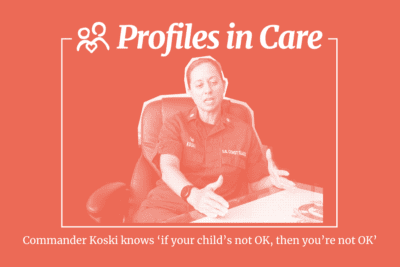
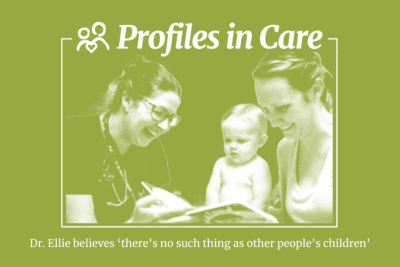

Milling, who worked at a child care program before joining the team at ApprenticeshipNC, said the apprenticeship model is ideal for early care and education.
“It takes time to become a good teacher,” Milling said. “There is science behind it, and there are lessons that can only be learned, or skills that can only be developed, in the context of being in the classroom. I can go do a whole bachelor’s in early childhood, get a B-K license. I could get a master’s. If I don’t do any kind of training in a classroom, then I’m only halfway there.”
Establishing a statewide model, advocating for statewide investment
After multiple group sponsors were established, Ford said the next important step in apprenticeship expansion came in October 2024 with the establishment of a statewide model through Early Years.
“There is a lot of paperwork and administrative work associated with apprenticeship,” Ford said. “And now when you join, the statewide program takes care of that for you.”
Now that the BBF pilot has ended and all the state expansion funding has been spent, the statewide program is able to connect employers with resources like the TEACH scholarships and consistent standards of quality.
“When they sign their application to join our program, we really think through the components of apprenticeship, which is the competency and job skills, the on-the-job training, the progressive wage, and that really high-quality mentor that they will have for two to four years,” said Deidre McMahon, workforce initiatives senior manager at the TEACH Early Childhood National Center. “My part is to help keep all of that consistent and positive, and to work with the administrator to really understand how this is a sustainable way to keep workforce within their program.”
The long-term sustainability of the workforce requires increases in the wages of early childhood educators, apprenticeship experts told EdNC. In March, Gov. Josh Stein established a bipartisan Task Force on Child Care and Early Education to come up with solutions to child care challenges.
The average hourly wage in 2024 for “child care workers” in the state was $14.20 in 2024, according to the Bureau of Labor Statistics.
Stein’s early childhood task force’s initial recommendations, released in June, recognized apprenticeships as one of the state’s “successful, ready-to-scale early care and education workforce programs.”
Ford said she is excited about the possibility of pulling together multiple entities “so that when someone’s entering the field, a lot of these supports are just right there at their fingertips.”
The legislature did not include any new funding for early care and education this session.
Related reads
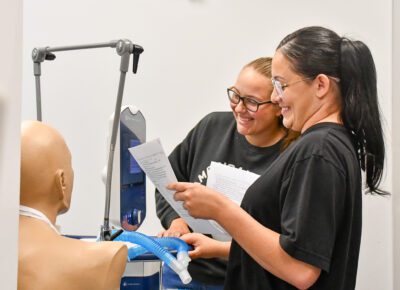
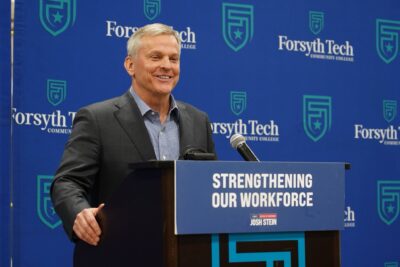

Ford is also working to ensure the early childhood educator workforce is represented in the state’s broader workforce development strategies.
Stein also established a new Council on Workforce and Apprenticeships in March. In his State of the State address that month, he set a goal of doubling the number of apprenticeships in the state over the next four years.
“No state will outwork North Carolina in workforce development while I am your governor,” Stein said in March at ApprenticeshipNC’s annual conference.
Leaders in business and government have identified the lack of affordable, high-quality child care as a top barrier to the state’s economic future.
“We need child care so that we can have workers,” said Williams, the DPI consultant. “And I think that’s something that gets missed sometimes in our assessment. We look at the industries — manufacturing, technology, business — but we don’t think of the workforce that supports that workforce.”
Related reads

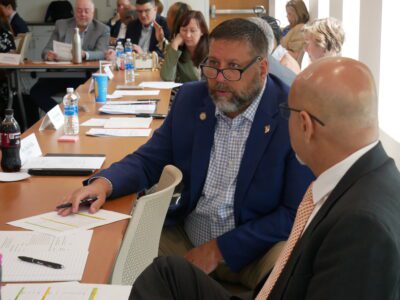

Reaching future educators in high school
Expanding pre-apprenticeships in high schools will be a next important step in creating an early childhood pipeline, Ford said.
“We really do want to start talking to our middle schoolers, our ninth and 10th graders taking the child development class, and show them how these classes that they’re taking that they might just think are interesting, what kinds of careers can you get out of them?” she said. “What do you need to do to move forward? What are the available options out there to pay for college?”
Staci Shaw, who teaches early childhood education at McDowell High School, has been doing just that in her classroom since 2021.
Hands-on learning has always been a part of her classes. Shaw’s students spend time in Early Head Start and Head Start classrooms three days a week. They also visit the on-campus child care center at McDowell Technical Community College.
The pre-apprenticeship program added free access to college for students who were interested in continuing into an early childhood apprenticeship, Shaw said.
She has had multiple students finish pre-apprenticeships, apprenticeships, degrees, and then work in local child care programs. In both the case of Head Start programs and the on-campus community college center, those teachers have access to benefits like health care and retirement plans — a rarity in the early childhood field. Shaw said she makes sure to let her students know about the unique opportunities in their county.



Her students are also filling a local need. Since the pandemic, Shaw said the demand for child care teachers has intensified.
“So if we get them young and they enjoy it, then we’re able to fulfill the jobs that are open here,” she said.
NCBCE has been working to expand pre-apprenticeships through NC Career Launch, which was awarded $4 million in August 2024 through a U.S. Department of Labor grant.
Williams said she has noticed a “slight increase” in recent years in high schools offering early childhood education pathways and pre-apprenticeships. But there is still a lot of work to be done.
She said more teachers need to wrap their brains around the opportunity in order to share it with their students. And all the entities — employers, schools, and community colleges — need to be on the same page. She said she thinks enrolling every early childhood high school student in a pre-apprenticeship would be a great idea “so no student misses that opportunity.”
Shaw is committed to developing her local early childhood workforce, though there are some realities, like the low wages of the field, she cannot fix.
“We haven’t fixed the problem, but we’ve removed one of those little barriers with students,” Shaw said.
Recommended reading
